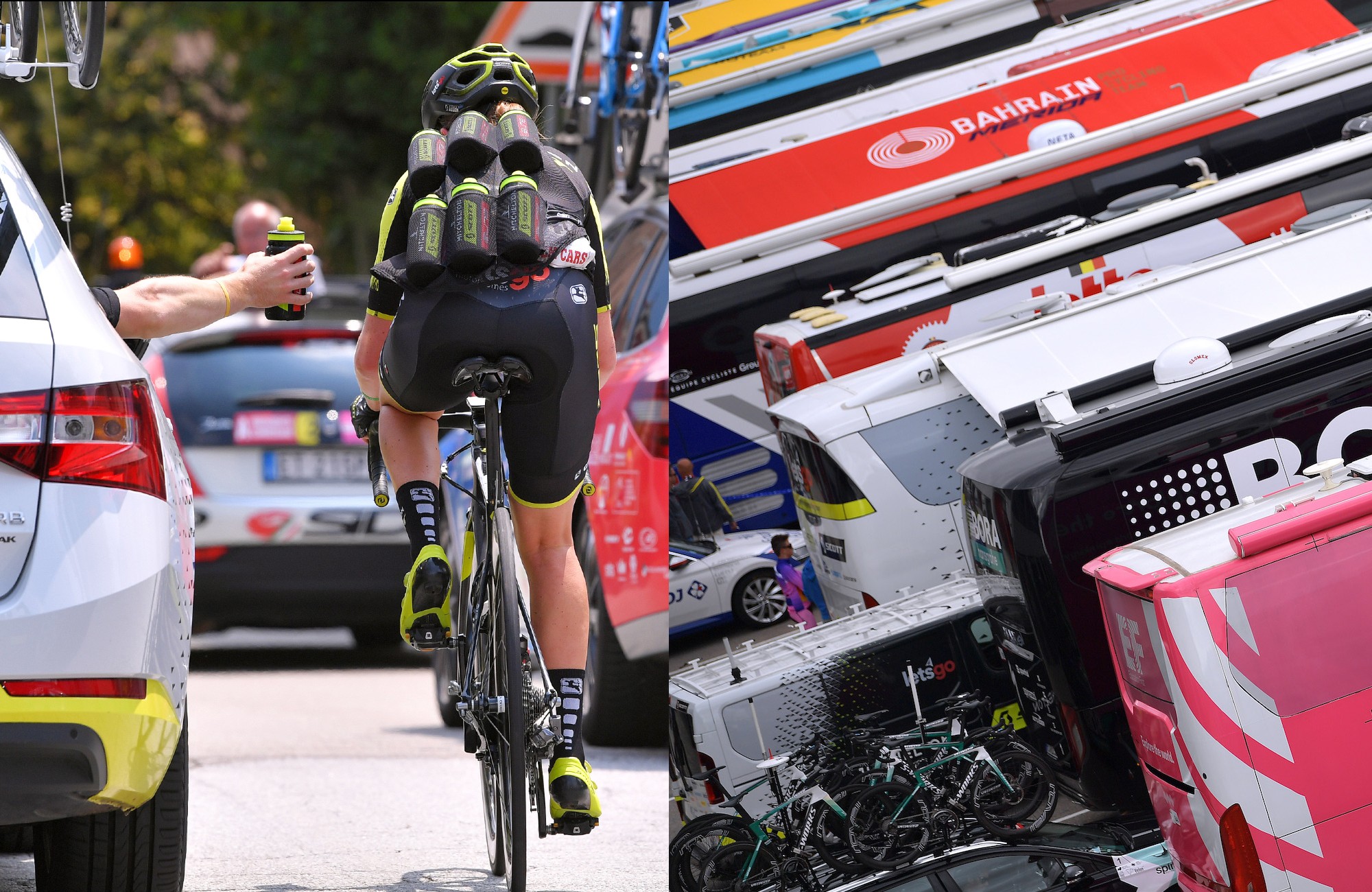27,000 bottles, 12,500 gels and 1,288 tonnes of CO2: The environmental cost of a WorldTour team
Deceuninck - Quick-Step have calculated their consumption and pledged to go carbon neutral

Bottle vest and team buses parked up at a race (Getty)
At their team presentation in Calpe, Spain, Deceuninck - Quick-Step performed the usual unveiling of their 2020 roster as well as bestowing sponsors with adequate attention and adoration. Slipped in the middle, however, was another announcement that is a first for a professional cycling team. Deceuninck - Quick-Step are going carbon neutral.
While the tide of environmentalist sentiment will only increase through this new decade, the world's top-ranked cycling team have pledged a number of energy-efficient improvements to their business operations. More crucially they have promised to offset their remaining CO2 emissions by supporting certified climate projects.
The first of two projects is providing an area of Uganda with a safe water supply, which reduces the need for water delivery or deforestation, with people burning wood in order to boil water, while the second is centred around an area familiar to cyclists, Mont Ventoux.
This second project will see the team partner with a forestry commission that focuses on conservation and reforestation in the region of the iconic French climb. Intended to tie in with the team's 'wolf-pack' branding, the area is known to be a habitat for wolves, whose numbers will benefit from the project.
>>> Cycling’s hidden under-fuelling epidemic
Some critics have pointed to flaws in the increasingly popular idea of carbon-offsetting, saying taking flights emits carbon today and that it's difficult to know how fast an offset can remove the newly-produced carbon from the atmosphere. However, Deceuninck - Quick-Step's pledge may push other teams to also begin taking steps to reduce their impact on the environment.
More interestingly, the team released a detailed breakdown of their annual consumption and carbon emissions, having raced in 20 countries over 272 days in 2019.
The latest race content, interviews, features, reviews and expert buying guides, direct to your inbox!
Splashed up on the projector in front of assembled media and sponsors, their total consumption for the past year was 1,288 tonnes of CO2, equating to 539 return flights from Brussels to New York. Forest area of over 3,000 football pitches is needed to capture this amount carbon dioxide.
Riding 325,000km over 79 races, an increase from the year before, requires a substantial amount of equipment alongside the support cars and flights required to take riders and support staff from race to race.
Deceuninck - Quick-Step revealed they use a whopping 27,000 bottles annually, alongside 750 jerseys, 2,500 caps, 180 helmets and 12,500 gels between their 27-man roster.
The Belgian outfit also used 280 Specialized bikes, with an additional 600 chains, 300 groupsets and 400 wheels.
Deceuninck - Quick-Step's British rider, James Knox, commented on the announcement, admitting the difficulty of marrying environmental initiatives while still operating a functioning WorldTour team, but said it was a start.
"Not easy to start projects like this without acknowledging the difficulties and somewhat inevitable hypocrisy of what comes with being an international team in our sport," the 24-year-old said. "But great to see the team and the sponsors help make a positive change, albeit small, for the environment."
Environmental projects aren't new to the peloton, from the Linda McCartney Racing Team's vegetarianism to Team Sky's Ocean Rescue initiative that saw the team's 2018 Tour de France jersey adorned with a whale, imploring fans and the public to reduce plastic consumption.
Just two years later, the team now sponsored by petrochemical giant Ineos have been accused of 'greenwashing' and also faced protestors at last year's Tour de Yorkshire.
Jonny was Cycling Weekly's Weekend Editor until 2022.
I like writing offbeat features and eating too much bread when working out on the road at bike races.
Before joining Cycling Weekly I worked at The Tab and I've also written for Vice, Time Out, and worked freelance for The Telegraph (I know, but I needed the money at the time so let me live).
I also worked for ITV Cycling between 2011-2018 on their Tour de France and Vuelta a España coverage. Sometimes I'd be helping the producers make the programme and other times I'd be getting the lunches. Just in case you were wondering - Phil Liggett and Paul Sherwen had the same ham sandwich every day, it was great.